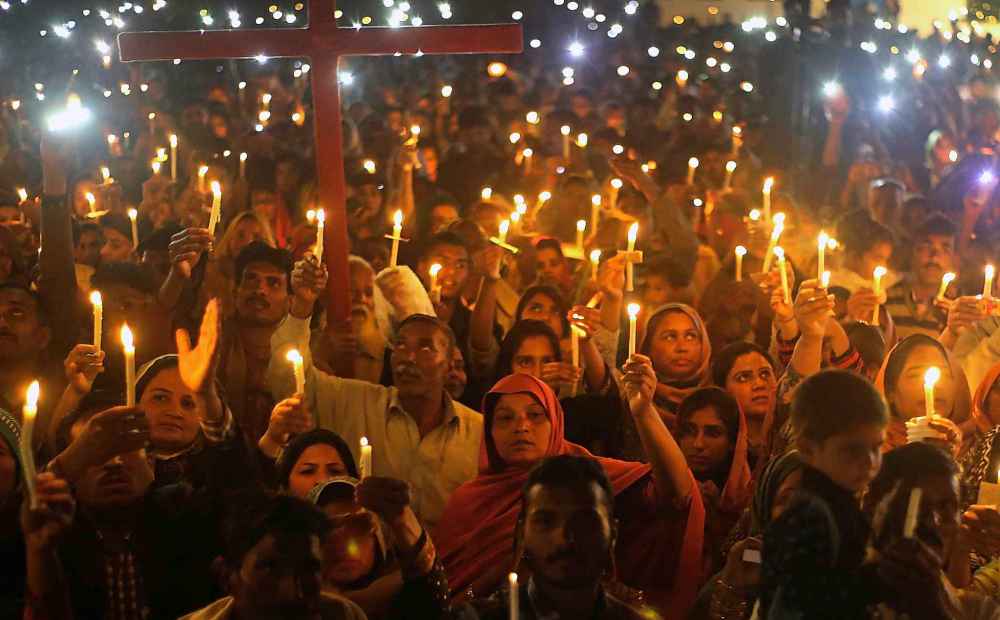Malignancy in our midst Dark corners of the internet offer fertile ground for insidious transformation of mostly young, white-male frustration into fast-spreading, hate-fuelled, violent extremism
Read this article for free:
or
Already have an account? Log in here »
To continue reading, please subscribe:
Monthly Digital Subscription
$0 for the first 4 weeks*
- Enjoy unlimited reading on winnipegfreepress.com
- Read the E-Edition, our digital replica newspaper
- Access News Break, our award-winning app
- Play interactive puzzles
*No charge for 4 weeks then price increases to the regular rate of $19.00 plus GST every four weeks. Offer available to new and qualified returning subscribers only. Cancel any time.
Monthly Digital Subscription
$4.75/week*
- Enjoy unlimited reading on winnipegfreepress.com
- Read the E-Edition, our digital replica newspaper
- Access News Break, our award-winning app
- Play interactive puzzles
*Billed as $19 plus GST every four weeks. Cancel any time.
To continue reading, please subscribe:
Add Free Press access to your Brandon Sun subscription for only an additional
$1 for the first 4 weeks*
*Your next subscription payment will increase by $1.00 and you will be charged $16.99 plus GST for four weeks. After four weeks, your payment will increase to $23.99 plus GST every four weeks.
Read unlimited articles for free today:
or
Already have an account? Log in here »
Hey there, time traveller!
This article was published 23/08/2019 (2300 days ago), so information in it may no longer be current.
When it starts, the boy is just 16 years old, crossing the awkward and unsteady bridge that links adulthood to youth, and he is lonely. One day, he opens up the social media site Reddit, and finds in its multitude of communities a place to ask the question that has been eating up his mind.
Until then, his posts had mostly been about video games, cars and gripes about his parents. Now, he wants to know how to get girls to like him. He asks, and gets responses directing him to online tracts by polemicists who posit opposite-sex relations as a sort of a game, dependent on pulling certain triggers at certain times.
This makes sense to him. Make the right inputs. Win the game. Get the prize.
Months go by, and the boy is being pulled deeper. He appears to be a voracious reader. He makes more posts, asking if it’s true what he read about women: that they are amoral, always hunting for better partners, that they cannot truly love. His fellow travellers assure him that it is, and it’s good that his eyes are open.
He is captivated now. This is the answer to what has hurt him, and it doesn’t stop with women. His Reddit activity becomes consumed by these topics, and the things he reads are intertwined with an entire ideological ecosystem that promises to restore what, in that view, is rightfully his but has been stolen from him.
The authors he reads blame women and Jews and non-white folks for the “degeneracy” of civilization. They rant against immigration. They love Donald Trump, except where he doesn’t go far enough. Still, they believe he is the opening salvo in a great resurgence of white male domination.
In the last year alone, at least four hate attacks were preceded by posts on 8chan, one of the most virulently fascistic forums on the internet, or one of its many spinoffs.
Flash forward two years after the teen made that first post asking for help with girls. He is 18 years old now, and his comments are loaded with darker fixations. He makes reference to anti-Semitic conspiracy theories. He dribbles racist euphemisms. He posts memes mocking a victim of white-supremacist terror.
It’s been a while since I reviewed his account. I don’t know what he believes now. Maybe it stopped there. Maybe he suddenly grew out of it. Or maybe, in the intervening months, he found his way to even more sinister online corners: the ones cloaked in shadows, the ones that organize “hate camps” to train in violent tactics.
It is important to know is that this young man is not unusual. Just one of many. Sometimes, deep into the night, I examine hateful accounts spotted in the wilds of social media. I read months and even years of their comments, looking to pinpoint the moment they got sucked into the ideology; it usually looks something like the above.
So this week, after Winnipeg Free Press reporter Ryan Thorpe’s chilling undercover investigation exposed a man in the Canadian Army Reserves recruiting for an extremist neo-Nazi group dedicated to “white revolution” forged through terroristic violence, we ought not be surprised. It is all around us now, though often hidden in shadows or just online.
To keep ourselves safe, we first have to name it. To see it in the light. To look at it plain.
It is hard to know what exactly drives some young men (but not others) to hate, what bitter alchemy in the brain transmutes everyday frustrations into slurries of ever more radicalized rage, bubbling almost inexorably towards violence. Not all will commit it, but virtually all of those who go far enough down that road will applaud it.
What is clear, from recent examples soaked in innocent blood, is that social media is a major driver. In the last year alone, at least four hate attacks were preceded by posts on 8chan, one of the most virulently fascistic forums on the internet, or one of its many spinoffs.
The 29-year-old Christchurch mosque shooter who killed 51 people and wounded another 49 posted his racist manifesto on 8chan. So did the 19-year-old who attacked a synagogue in Poway, Calif., in April, killing one woman and injuring three others, including the rabbi. So did the 21-year-old man who massacred 22 people at an El Paso, Texas Walmart earlier this month, a terroristic response to what he called a “Hispanic invasion.”
In Norway earlier this month, a 21-year-old man made an online post on Endchan, an 8chan spinoff, praising the Christchurch shooter as a saint, before he entered a mosque wearing body armour and began shooting; he was tackled by a courageous 65-year-old man and forcibly subdued before anyone was struck.

He is now charged with the murder of his stepsister, found dead in their home.
All of these attacks, and more, can be traced back to online radicalization. To those who are not quite so immersed in online culture, it’s hard to explain how ubiquitous this type of hate is on social media, how easy to find, and how well-developed the ideological networks to usher young men into ever more extremist thinking.
Consider this: on Wednesday, in response to the Free Press reporting, defence minister Harjit Sajjan tweeted that “racism and white supremacy have no place in our Canadian Forces.” A quick browse of many negative responses led me to an account that frequently shared explicitly white-supremacist content.
Just like that, within three clicks and two minutes, I had gone from reading a statement by a Canadian politician, to being awash in deluges of hate material from dozens of accounts: tweets praising Hitler as a misunderstood hero, urging forced removal of non-white citizens from North America and arguing for the end of female suffrage.
Here is the bad news: there is almost no way to stop that part of it.
Twitter has been infamously slow to evict white supremacists from its platform, and when it does shut down some of their accounts, they quickly return under a new name.
In the wake of attacks, some companies that provide crucial online infrastructure to hate sites sometimes pull the plug on their troublesome, high-risk clients. That slows them down, but only briefly; they soon create other sites.
In the meantime, the attacks pile up: Christchurch. Pittsburgh. Poway. Gilroy. El Paso. Then there are the attacks that weren’t, but could have been: this month alone, U.S. authorities arrested six men under suspicion of planning mass shootings. All but one were under the age of 25. Most had a direct online link to white-supremacist ideology.
There will be more attacks, both planned and completed, that much is all but certain. But we can push back.
The battle against white terrorism will not be won online. We cannot stop the ideology’s spread completely. What we can do is make our communities more informed, our public institutions harder to penetrate. We can demand better accountability from social media or internet companies that enable space for hate to flourish.
In Canada, authorities must commit to making combating white-supremacist terrorism a priority. They must invest significant resources in keeping up to date with the rapid proliferation of extremist groups expanding into Canada, including The Base, which has been actively recruiting in Winnipeg.
The military, too, needs to be more accountable to the ideology’s spread within its own ranks. Earlier this year, an internal military report revealed that 53 Canadian Armed Forces members had engaged in hate groups or racist behaviour since 2013; that included membership in Atomwaffen, a militaristic neo-Nazi organization with members linked to The Base.
Former white supremacist says to question hateful ideologies

Posted:
The following is a conversation with Brad Galloway, who, for 13 years, was a fixture in Canada’s organized racist community. He was associated with Toronto’s skinhead movement and later became the national leader of the British Columbia-based Volksfront white-separatist group.
Of the 16 identified as being in hate groups, nine remained in the Forces at the time of the report.
Despite this alarming figure, which experts on hate groups believe is likely under-representative, the report concluded that since the incidents involved a tiny minority of military personnel — less than 0.1 per cent — “hate groups do not pose a significant threat to the CAF/Department of National Defence.”
Perhaps not or, at least, not yet. But even a handful of members pose a significant threat to the public, and the military has unique tools to ensure that it is not training and paying a new generation of Canadian terrorists. For Canada’s sake, it can and should do better.
Meanwhile, at the community level, parents should arm themselves with knowledge about how radicalization works and talk with their children. Browse online hate forums for a little while and it becomes evident that many parents don’t know what their teens are really getting up to online; solutions can start at home.
Above all, we can vow that when neo-Nazis try to organize in Manitoba, they will not find the safety of shadows. Local activists have, so far, done strong work identifying and disrupting white supremacists’ organizing attempts; several planned events have fizzled out in the face of stout community resistance.
We will need more of that, in the years to come. Ours is a resilient province, thick with community, rich with promise. Whatever happens, let it never be a comfortable refuge for anyone who dreams of organizing violence against us.
melissa.martin@freepress.mb.ca
Our newsroom depends on a growing audience of readers to power our journalism. If you are not a paid reader, please consider becoming a subscriber.
Our newsroom depends on its audience of readers to power our journalism. Thank you for your support.





















